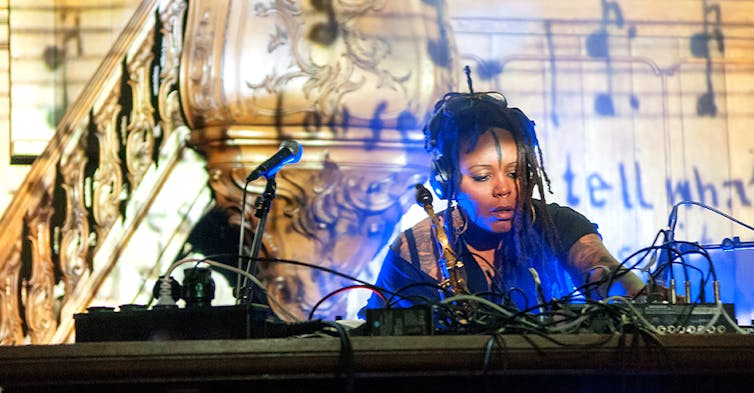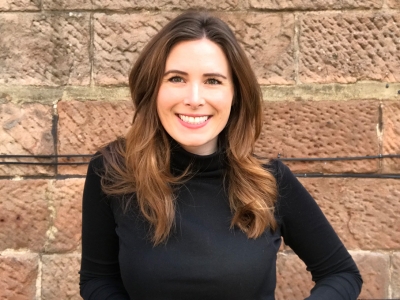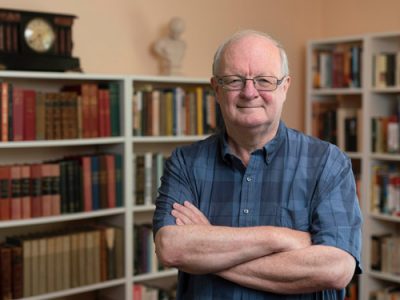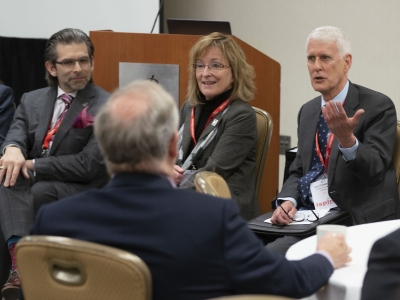By Daniel Fischlin, Jesse Stewart and Laura Risk
This article is republished from The Conversation under a Creative Commons licence. All photos provided by The Conversation from various sources.
The COVID-19 pandemic has made us all improvisers. Medical researchers raced to develop vaccines. Students and teachers adjusted to online classes and socially distanced learning. Collectively, we improvised new ways of being together while apart.
Musicians and musical communities, meanwhile, found themselves improvising their very livelihoods in response to the pandemic.
In March 2020, when the Canadian music industry shut down, we began a conversation that led to the Spring 2021 publication of two linked volumes of the online journal Critical Studies in Improvisation / Études critiques en improvisation. The subject: musical communities and improvisation during the COVID-19 pandemic.
As in so many other facets of our economy, we are called upon to build back better. To do so requires a basic level of economic and social security for freelancers working in the performing arts.
Economic viability of pre-pandemic models
We invited academic and non-academic pieces from improvising musicians, community organizers, activists, industry personnel and scholars who were responding in creative ways to the pandemic. The 60-plus pieces in these volumes — articles, testimonials, interviews, videos, a zine, a podcast — challenge us to reflect on this extraordinary time.
We heard accounts from communities of freelance musicians, small venues and arts organizations that have been some of the hardest hit in the creative economy.
Necessary social distancing quickly unravelled the presumptions of mobility and physical closeness that underpin music-making and music consumption. Virtual performance spaces proliferated in response to the pandemic. But those new spaces also called into question the economic viability of current models of musical performance, curation and dissemination.
‘Creative commons’ is vital
Social distancing revealed how much we value the human connection music brings. Music therapist Tom Sweitzer, and researchers around the world, have shown that music is key to sustaining mental health and social connection during the pandemic.
Sequestered in our homes, many of us turned to music. The pandemic showed how the creative commons — the myriad spaces in which diverse forms of human expression are produced, explored, celebrated — are vital to civil society.
Authors wrote of the multiple precarities of making a living through music, all exacerbated by the pandemic.
Some discussed what many scholars named this year as “the other pandemic” of systemic racism, anti-Black racism and white supremacy. These problems have received increased attention in response to the brutal murder of George Floyd and killings of many other Black people by police.

(Rewire Festival/Ed Jansen/Flickr), CC BY-NC
Powerful texts by improvising saxophonist Matana Roberts and interdisiplinary Black studies scholar Rinaldo Walcott address the racial violence threatening Black creative practitioners and communities and the collective work needed to bring about change.
Fair and equitable funding
Forced to improvise new ways of musical being-in-the-world, contributors proposed an abundance of actions.
Alan Greyeyes, director of the sākihiwē festival (interviewed by Anishinaabe musician and composer Melody McKiver), calls for federal funding bodies to increase support for participatory practices in Indigenous communities. Greyeyes notes that the Department of Canadian Heritage should change its funding criteria to work for powwow dancing as it is practised.

(Justin de Nooijer/Flickr), CC BY-SA
Other contributors — including pianist Marianne Trudel, guitarist Aram Bajakian and jazz fusion collective Snarky Puppy frontman Michael League — call for fair compensation in the creation and recording of music. The call for fairness extends to Canadian-specific entities like the Society of Composers, Authors and Music Publishers of Canada (SOCAN) and big tech aggregators like YouTube, Apple, Spotify and Google.
Two international collaborations — one involving authors with legacies in creative scenes in Greece and Iran, filtered through migrant experiences in the United Kingdom and Austria, the other
by people working in Ecuador, Indonesia and Florida — highlight how the pandemic exacerbated the already precarious position of musicians.
These collaborations consider a variety of national contexts under neoliberal capitalism — whereby across the world, artists feel the effects of what happens when states promote free markets and corporate profits in lieu of bolstering commitments to public welfare and an equitable sense of the common good.
Contributors discuss how support for youth engagement with the creative commons is critical. This is especially so for inequitable public education systems where access to programs has been severely constrained.
Civic-well being
Numerous testimonials discuss the challenges of sustaining community-owned and artist-driven co-op spaces. These are spaces where improvised music develops and flourishes, incubates new artistic directions and gives sanctuary to diverse practitioners.
They include new artist-driven virtual spaces that sprang up during the pandemic across the country, and also longstanding institutions such as independent venues and annual music festivals that feature jazz and improvised music.
Arts and community organizations require infrastructure, committed leadership and resources for programming that is generative, informed and attentive to difference. It is essential to support these spaces that play such a crucial role in fostering community and civic well-being, and in sustaining a larger network of creative outputs and economies.
Privilege, exclusion in the arts
Throughout the volumes, there are urgent calls to recognize how privilege, belonging, exclusion and violence are at work in the arts.
Reimagining how we allocate resources to the creative commons has much to learn from improvisation. Precarity, resourcefulness, the capacity to make a way out of no way. The repurposing of tools intended for other uses. These are all part of the accomplished improviser’s expansive toolkit.
The truth is that many precarious communities — where people are vulnerable to economic exclusion, or systemic racism or intersectional barriers — generate inspiration and creative ferment.
George Floyd, after all, was a freestyle rapper. Floyd’s work was respected on his home turf of Houston’s Third Ward, the same community space that gave rise to Beyoncé and jazz pianist improviser extraordinaire Jason Moran. Improvisation, there, as elsewhere, is the uncommon power nested in the commons.
Spaces that matter energize experimentation and incubate new practices. They support a wide range of musical genres and communities of difference, fostering inclusion and diversity. For example, dancer Nic Gareiss interviews interdisciplinary artist Ty Defoe, from the Oneida and Ojibwe Nations, about practices related to ‘Indigiqueering’ spaces.
Participatory decision-making about arts
So, how do musicians build on the lessons learned during the pandemic? Tkarón:to-based multi-disciplinary performing artist Olivia Shortt says, “This isn’t the new normal. This is life.” The impact of the pandemic on musicians will, in other words, be ongoing.
The voices gathered in the two volumes argue for a fundamental first principle. Direct actions — that is, public policy — that support the allocation of resources to the creative commons should avoid top-down decision making. The latter limits the influence and lived experience of those most in need of access to, and use of, precious public resources.
Sustaining the generative diversity that makes for a healthy public commons requires more transparent forms of dialogue. But also less gatekeeping. And more community spaces where voices are listened to, and reclaim their remarkable capacity to inspire and transform.
![]()
Thursday, August 19, 2021 in The Conversation
Share: Twitter, Facebook



